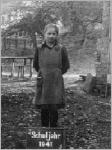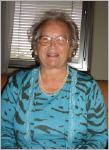7ABS, 8C, Jänner 2009


Hermine Liska 1941 und 2007
Weitere Informationen zu Hermine Liska
The
Contemporary Witness
7ABS, 8C,
Jänner 2009


Hermine Liska 1941 und 2007
Weitere Informationen zu
Hermine Liska
Geschichte, Ethik, Englisch – geschickt verknüpft durch Ines Lengauer.
Am 12.
Jänner dieses Jahres lauschten rund 80 SchülerInnen aus der 8C, 7A, 7B, 7S zwei
Unterrichtseinheiten lang fast mucksmäuschenstill Frau Hermine Liska: Die
vom Bundesministerium für Bildung, Wissenschaft und Kultur anerkannte Zeitzeugin
berichtete über ihre Jugendzeit, in der sie als „Bibelforscherin“ den
Verfolgungen des Dritten Reiches ausgesetzt war.
Ines L. verfasste folgenden Bericht in der ersten lebenden
Fremdsprache Englisch für unsere Homepage.
On Monday
the 12th of January, we had the pleasure to listen to the moving
story of Hermine Liska, a contemporary witness of the crimes during World War2.
But at first another lady gave us a quick insight of the Nazi regime, the use of
propaganda and the erection of Concentration Camps.
Hermine Liska was born in 1930, in Carinthia, where she spent her early days as
a child of Jehovah’s Witnesses with her four brothers. She remembered her
childhood as idyllic because she lived in a rural area, on a big farm. The
community was bonded closely. Every Sunday, she told us, she looked forward to
Monday because then she could go to school, which she enjoyed very much. She
even dreamed of becoming a teacher.
When she grew older, she noticed that many farmers around had debts and
unemployment was rising. Although their neighbours
were hopeful that Adolf Hitler would bring a great change, her mother stayed
worried, even after the annexation. All the members of her family were
informed of the existence of Concentration Camps yet; anyway, they took all
risks to defend their belief.
When Hermine came to school she refused the Hitler
salute, which caused a lot of problems for her. The headmaster advised her to do
what she was told to, but she insisted on Jesus Christ being her leader and
found different ways to avoid this special greeting.
Anyway, her class mates were nasty and called her a Jew, a bad swear word at
that time. One of them even said her brother should be hanged.
Later on she was sent back to the first class, which gave her a feeling of
disgrace.
Another problem was that her parents refused to send her to the BDM. Sometimes
Hermine felt that she was lacking a lot of fun because there they got beautiful
uniforms and on Sunday they got always cacao, something that was rare.
Because her father refused to sign a decline against his belief, his right to
educate his children was withdrawn. Then Hermine’s worst time in her life began.
She came to an approved school in Feldkirchen, where they offered her to visit a
secondary school (something really expensive, most parents couldn’t afford it)
if she joined the Hitler salute, - again she refused to do so.
In the institution, where she was taken to, she had especially at night a
problem to fall asleep. She was used to sleeping in the same bed as her mother
did until she was eleven years old. Again she refused and was brought away,
when the school administration found out that her father visited her on her way
to school.
Although, she spent a horrible time far away from home, Hermine had a lot of
luck, things could have been worse for her. At least people stayed patient
because she had blond hair and blue eyes and at the “Adelgunden Anstalt” (in
Munich) she was allowed to go out alone in the evening.
One day her headmaster told her if she didn’t behave she would come to a closed
ward.
When the bomb attacks increased, Hermine was taken to a farmer, where she helped
every day.
In March 1944 she came back to Munich, but the attacks got even stronger and she
and other children had to spend every night in a shelter.
Her parents wrote a heap of letters in which they asked public authorities for
Hermine to come back. Finally she was allowed to return, but not for a long
time. Afterwards she found out that nine girls who also had stayed in the
institute were killed during an attack, some days after she had left. Some
weeks after she had arrived at home, she had to go to a place near Klagenfurt,
where she had to help a farmer until May 1945, then war was over and she was
allowed to return home.
I was fascinated by her civil courage and disobedience, I’m glad she visited our
school.
| letzte Aktualisierung: 04.02.09 | Zur Startseite |